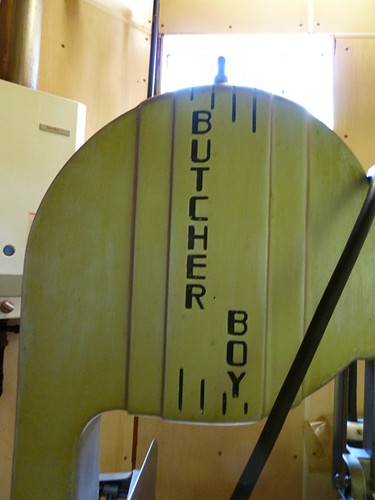
Bryan Burroughs’ book Public Enemies, which leant its title but not much else to the recent Johnny Depp Dillinger movie, is one of those books that changes how you see the place where you live. We’re used to the idea of the urban gangster, Capone et al., but the bank robbers he focuses on were really a rural phenomenon created by the automobile— in fact, exactly what you would get if you took earlier horseback robbers like Jesse James or Butch Cassidy, and gave them a Ford. The automobile gave them the ability to swoop into a small town, rob it blind, and then be miles down some country road before the sleepy local constabulary even knew what hit them. And often, the place they’d be heading to would be another kind of small town, which had a crooked sheriff who spent most evenings at the card game in the back of the local garage owner/fencer of stolen goods, and would arrange for the robbers to hide out for a few days till the coast was clear.
I imply nothing about the past of the town of Hampshire, a tiny town a little ways south of I-90 past the last outlet mall west of Chicago, which for all I know was as clean a place as you could wish. The Dillingeresque activity around Chicago tended to be closer to the lake and the Indiana or Wisconsin borders, anyway. But seeing as perfect a slice of small town America as Hampshire’s short commercial strip, and then barreling out of it past corn fields, it was hard not to imagine myself one of those fedora-brimmed tough guys, making off at high speed with the loot. Only, my loot was bacon.

I’ve bought Dreymiller & Kray products before at various places (they’re at Fox & Obel, Treasure Island and others in the city), but the one time I tried to go there, I made the mistake of hitting Ream’s in Elburn first, and they were closed by the time I got there, shutting the door at 2 on Saturdays.
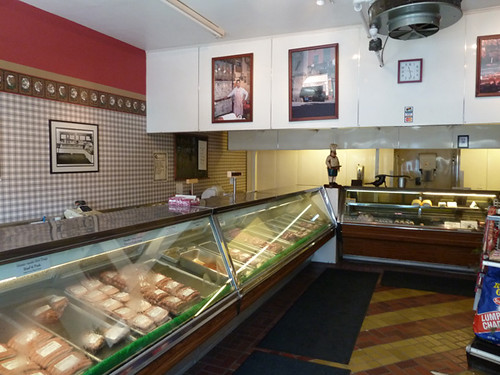
Not exactly preserved in amber, Dreymiller & Kray nevertheless still has the look of the 1930s era business it is. But the current owner and his longtime staff have been working on expanding into the Chicago market, and I had a chance to talk with them at Baconfest last spring. They’re doing a nice job of balancing still being the vintage small town business they are with taking advantage of their heritage and products as something marketable in the big city. And so you have a business which displays a menu from chichi Terzo Piano at the Art Institute with their bacon on it… and also displays handknitted potholders for sale on behalf of some local church or school group.
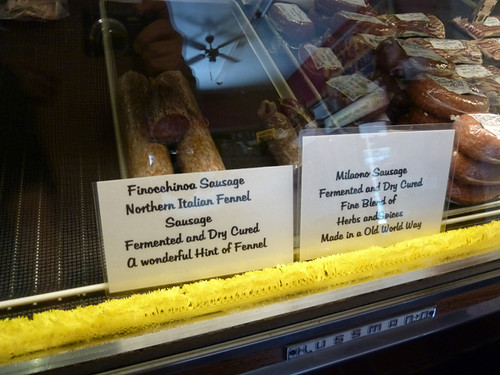
I picked out a nice assortment of their products, from bacon to brats, and then got to talking with Keith, a longtime employee who I remembered from Baconfest. He called my attention to some of the fermented sausages they started making after Ed, the owner, visited Italy. Like other charcuterie-makers, they’ve had to wrestle the health inspectors a little to get them to permit them to sell these unfamiliar products without processing in the same way as conventional meats, but he says they’ve mostly accepted that after 80 years, Dreymiller & Kray know what they’re doing. I salute these noble public servants for their obvious good sense.
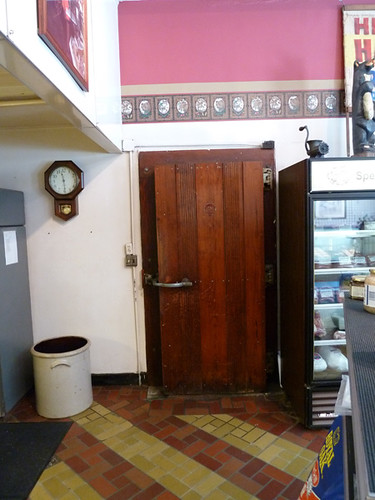
I asked about one especially picturesque old wooden door and if it was still in use. “Every day, that’s the way to our smoke house,” Keith said. “Want to see it?”
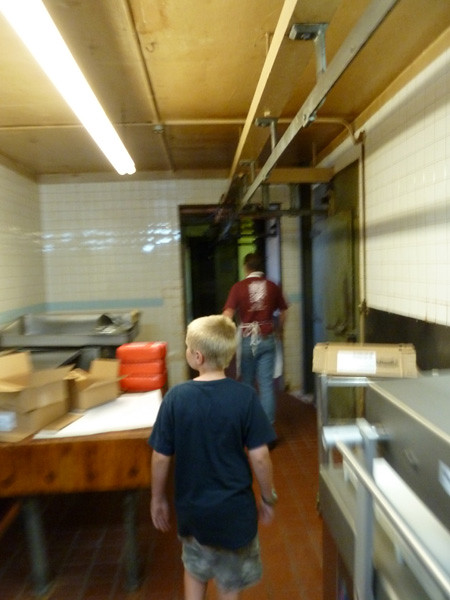
My fellow meat enthusiast and I eagerly accepted this invitation and Keith led us back into the halls of the deceptively long and narrow building. He explained that the store opened in 1929, but the founder was a bit casual at first about the smoking, and about a year later, he burned the whole block down. He set up temporary shop in the hardware store across the street for several months, and the current building, including a much more fire-resistant smoke house, was opened in 1931.
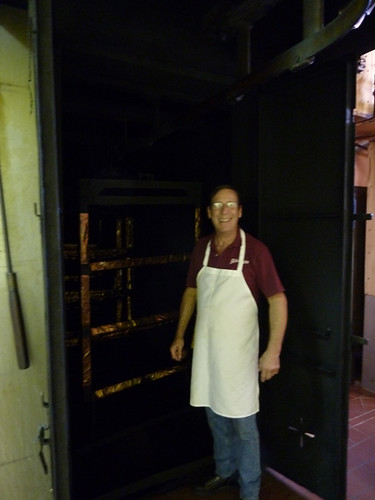
I wish I could show you how splendidly atmospheric the smoke house is… but of all the smoke houses I’ve seen, from Susie-Q’s to Calumet Fisheries to Smitty’s in Texas, this has to be the pitch-blackest, virtually impossible to photograph unless you had a bank of klieg lights. So he explained its operation as I peered into its inky depths. The racks, which are suspended from the ceiling on a track system (also used to move sides of beef around the building), can hold a total of 800 pounds of bacon at a time, which will spend a full 24 hours cold-smoking in the smoke house, being brought up to 140F at various points to meet government regulations. (They keep temperature records on every batch, and are inspected daily to ensure that things are running properly.) The coals are fed into a moon-shaped firepit at the bottom. Last year, they made 23,000 pounds of bacon, which by my estimate, would be about 230 pounds per resident of Hampshire annually if they weren’t selling most of it elsewhere by now. I’ve had it before and it’s really nice stuff, good quality pork (ruby-red like the stuff I make at home) and with a subtle smoke and salt flavor. If you haven’t bought bacon from a butcher shop that smokes their own— Paulina, of course, being another one in Chicago— you really need to see how much better and cleaner it tastes than standard industrial bacon.
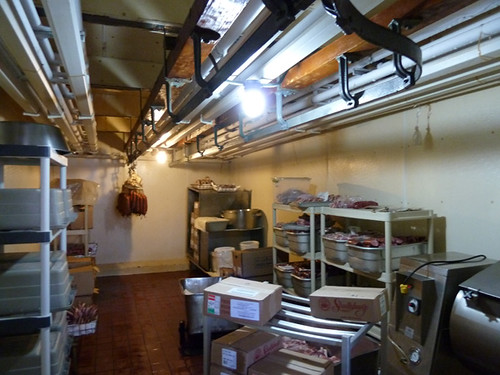
As the volume has risen, they’ve added new technology to their old butcher-shop ways. This is their walk-in cooler, and the machine at right is a tumbler which, by jostling the pork bellies around, cures them in about two days, instead of the week or two it used to take. He also demonstrated their high-volume vacuum sealer, which they clearly are happy to have, since they vacuum-seal just about everything in the shop except the knitted potholders.
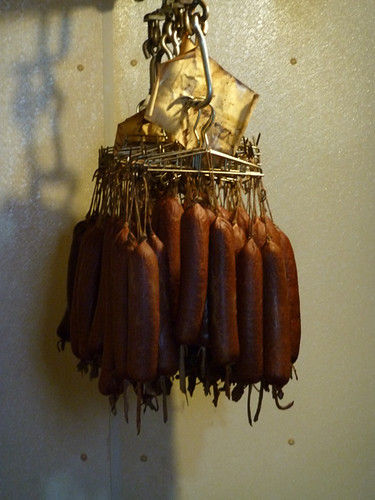
Thanking him for our tour, we left with a bunch of fresh sausage and bacon and a chunk of the finocchiona, and headed for Elburn, about 20 miles south. Ream’s, a somewhat bigger meat market renowned for its wide range of sausages and brats, has been written about a fair amount elsewhere, they even have a Dolinsky icon by the door, and in any case they were too busy on a Saturday afternoon to put up with somebody like me cross-examining them about their business as Keith at Dreymiller & Kray had done. But we added to our meaty loot here with various brats and wieners, and I noticed that they too were now dabbling in cured fermented Italian sausages, and bought some slices of their finocchiona, too.
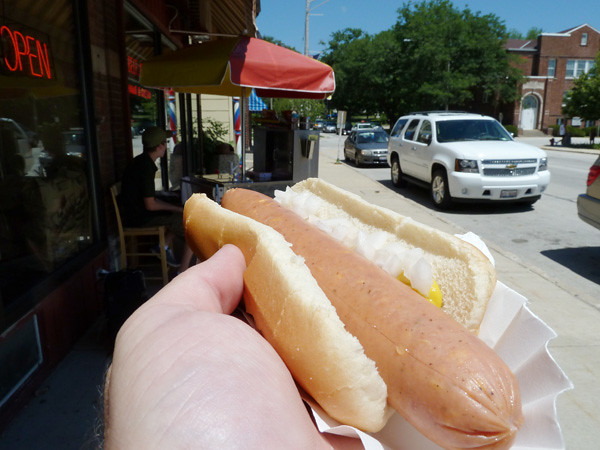
On Saturdays, Ream’s has a little stand out front selling their hot dogs and one of their various housemade sausages. Today’s was a cheese brat which had apparently won some competition somewhere. Considering that just two days earlier I had had Old Town Social’s cheese wiener at the Green City Market BBQ, this was shaping up to be a heck of a week for cheese filled tube steaks, and though the cheese wasn’t as good as the Brunkow that Old Town Social used, this was still a pretty wonderful lunch.

When we got home I did a Kane County finocchiona taste-off. Dreymiller & Kray’s, the more finely ground one on the right, had a strong lactic taste from the fermentation culture, and an actual hint of fennel (visible in the photo); it seemed more homemade. Ream’s, the coarser slices on the left, had little fennel flavor but a nice meatiness that tasted like the pork it came from, and seemed more professional, vaguely. Both were plenty good. Just try and take ’em away from me, copper!
Dreymiller & Kray
140 S. State St., Hampshire
(847) 683-2271
Ream’s Elburn Market
128 N Main St, Elburn
630 365-6461
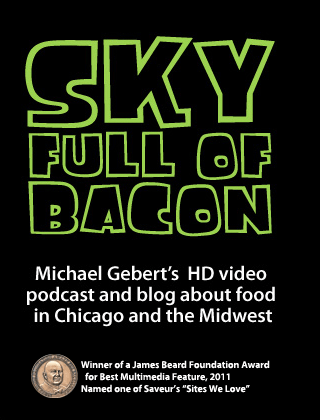

 If you like this post and would like to receive updates from this blog, please subscribe our feed.
If you like this post and would like to receive updates from this blog, please subscribe our feed.




